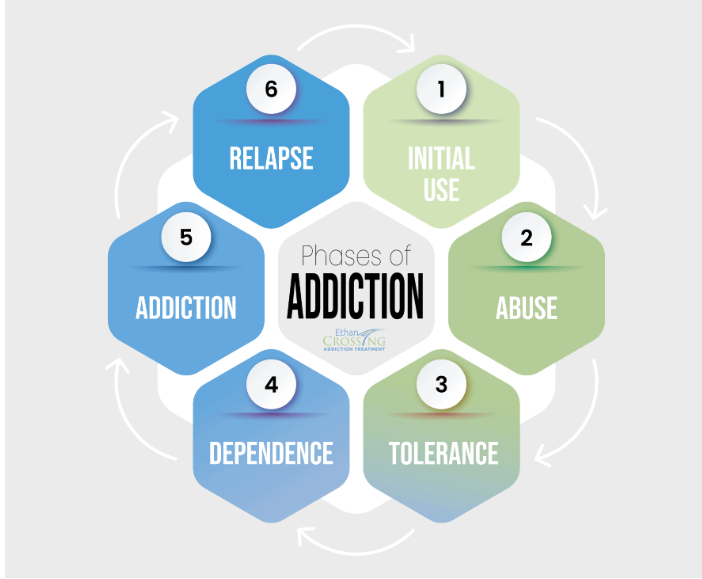Addiction is a complex and multifaceted issue that affects individuals across various aspects of their lives. It is essential to understand the different levels of addiction to recognize the severity of the problem and provide appropriate support and treatment. So, If you are indulging in drug addiction then you should consult with a psychiatrist or take admission in the mental hospital Lahore.
In this section, we will explore the five levels of addiction, ranging from early experimentation to severe dependence. By shedding light on these levels, we aim to promote awareness, and understanding, and ultimately, facilitate effective intervention and recovery.
Let’s dive in to get more details.
Level 1: Experimental Use
At this initial stage, individuals engage in occasional and experimental substance use. It often involves curiosity and social influences, with limited impact on daily life and functioning. However, it is important to note that even at this level, there is potential for the development of more severe addiction.
Level 2: Regular Use
In level 2, substance use becomes more frequent and may be driven by a desire for enjoyment or stress relief. The individual starts to incorporate substance use into their routine and may begin to rely on it for certain situations or emotional states. Regular use can start to affect personal responsibilities and relationships.
Level 3: Risky Use
At this stage, substance use becomes riskier and more problematic. The individual may engage in high-risk behaviors while under the influence or experience negative consequences as a result of their substance use. Risky use may also involve an escalation in the amount, frequency, or intensity of substance use, leading to a greater impact on overall well-being.
Level 4: Substance Abuse
Substance abuse is characterized by a loss of control over substance use. The individual continues to use substances despite experiencing significant negative consequences in various areas of life, such as work, relationships, and physical or mental health. A pattern of compulsive and destructive behavior often emerges, indicating a need for professional intervention.
Level 5: Addiction
At the highest level of addiction, individuals experience a chronic and relapsing brain disorder. Addiction is characterized by a compulsive and uncontrollable urge to seek and use substances, despite adverse consequences. It affects all aspects of life, leading to severe physical, psychological, and social impairments. Professional treatment, support, and ongoing management are critical in addressing addiction effectively.
Understanding the progression through these levels of addiction helps individuals, loved ones, and healthcare professionals recognize the severity of the problem and intervene at the appropriate stage. With early identification and the right support, individuals can embark on a path of recovery and reclaim their lives from the grip of addiction.
Signs and Symptoms of Addiction
Addiction manifests through various signs and symptoms, which may vary depending on the substance or behavior involved. Common indicators of addiction include:
- Cravings: Intense and persistent urges to engage in the addictive behavior or consume the substance.
- Loss of Control: Difficulty in limiting or stopping the behavior or substance use, even when there is a desire to do so.
- Tolerance: Needing larger amounts of the substance or engaging in the behavior more frequently to achieve the desired effect.
- Withdrawal: Experiencing physical or psychological symptoms when attempting to cut down or stop the behavior or substance use.
- Neglecting Responsibilities: Prioritizing the addictive behavior or substance use over important obligations at work, school, or home.
- Social and Interpersonal Problems: Difficulties in relationships, conflicts with loved ones, or social isolation due to the addictive behavior or substance use.
Impact on Physical Health
Addiction can have severe consequences on physical health, including:
- Physical Dependence: Developing a reliance on the substance or behavior to function normally, leading to withdrawal symptoms when attempting to stop.
- Risk of Overdose: Increased vulnerability to overdose, especially when consuming substances in excessive amounts or engaging in high-risk behaviors.
- Deterioration of Physical Well-being: Neglecting self-care, experiencing fluctuations in weight, disrupted sleep patterns, and increased susceptibility to illnesses.
Impact on Mental Health
Addiction can significantly impact mental health, resulting in:
- Co-occurring Mental Health Disorders: The presence of mental health disorders such as depression, anxiety, or substance-induced psychiatric conditions.
- Cognitive Impairment: Decreased cognitive function, impaired decision-making, and difficulties with memory and concentration.
- Emotional Disturbances: Mood swings, irritability, and emotional instability due to chemical imbalances and the impact of addiction on brain chemistry.
Effects on Relationships and Social Life
Addiction takes a toll on relationships and social interactions, leading to:
- Isolation and Alienation: Withdrawing from social activities, neglecting relationships, and experiencing increased conflicts with loved ones.
- Breakdown of Trust: Engaging in deceptive behaviors, lying, or stealing due to the overwhelming need to support the addiction.
- Financial Consequences: Financial strain due to excessive spending on substances or the costs associated with the addictive behavior.
Seeking Help and Treatment
Addiction is a complex disease that requires professional treatment, ongoing support, and management. Treatment options may include:
- Detoxification: A medically supervised process to manage withdrawal symptoms and rid the body of substances.
- Therapies: Individual or group therapy to address underlying issues, learn coping skills, and develop healthy behaviors.
- Medications: Medications may be used to manage cravings, reduce withdrawal symptoms, or treat co-occurring mental health disorders.
- Support Groups: Peer support groups provide a safe space for individuals in recovery to share experiences and receive encouragement from others facing similar challenges.
It’s important to remember that recovery from addiction is a lifelong process and may involve setbacks and relapses. With the right treatment and support, individuals can manage their addiction and live healthy, fulfilling lives. If you or someone you know is struggling with addiction, seeking professional help is the first step towards recovery.
So don’t hesitate to reach out for support and start your journey towards a brighter future. Stay strong, stay hopeful, and never give up on your path to overcoming addiction.
Conclusion
Recovery from addiction is a challenging but achievable journey. It requires determination, support, and a commitment to making positive changes. Through a combination of professional treatment, therapies, medications, and support groups, individuals can regain control of their lives and manage their addiction successfully. It’s important to remember that setbacks and relapses may occur, but with perseverance and the right resources, a brighter future is within reach.
If you or someone you know is struggling with addiction, don’t hesitate to seek professional help and take that crucial step towards a healthier and fulfilling life. Remember, you are not alone, and there is hope for recovery. Stay strong, stay hopeful, and never give up on your path to overcoming addiction.






Leave A Comment